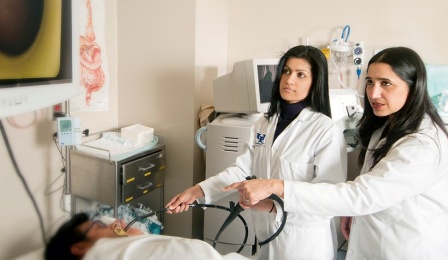Curriculum

During each year of our program, you will train with experienced, attentive faculty and work with patients who have conditions across the spectrum of gastroenterology.
Our curriculum will develop your knowledge, patient care, research skills, communication and professionalism about the full spectrum of conditions you will encounter as a specialist in gastroenterology.
Our program places strong emphasis on gaining in-depth knowledge of the pathogenesis, manifestations and complications of gastrointestinal disorders. Our training stresses the importance of understanding patients’ behavioral adjustments to their problems, the impact of various modes of therapy and the appropriate use of laboratory tests and procedures.
You will be exposed to every facet of gastroenterology during our three-year fellowship. Your training will include opportunities in hepatology, endoscopy, clinical nutrition and gastrointestinal oncology.
Our fellowship has a high board pass rate; we'll ensure that you are prepared to successfully complete your board certification examination.
Research Track and Clinical Track
We offer two curriculum tracks to help you develop expertise tailored to the career you want.
During your second and third years, you will embark on research training and advanced procedures rotations. The amount of modules you engage in depends on the program track — clinical or research — you choose to undertake.
Teaching Rounds
We hold teaching rounds at Erie County Medical Center and the Buffalo VA Medical Center six days per week. At Roswell Park Comprehensive Cancer Center, we hold teaching rounds five days per week.
Our rounds provide you with the opportunities you need to gain familiarity with presenting consultations, interviewing and examining patients at the beside, and reviewing materials including X-rays and pathology slides.
Along with our attending physician, you'll develop diagnostic and therapeutic management plans. You can expect our rounds to last 2–4 hours each day.
Procedures
Our program provides you with valuable opportunities to increase your familiarity with a variety of procedures. We'll help you master diagnostic and therapeutic techniques, technologies and procedures including:
- computed tomography
- contrast radiography
- enteral and parenteral alimentation
- endoscopic retrograde cholangiopancreatography, in all its diagnostic and therapeutic applications
- gastric, pancreatic and biliary secretory tests
- magnetic resonance imaging
- nuclear medicine procedures
- pancreatic needle biopsy
- percutaneous cholangiography
- ultrasound, including endoscopic ultrasound
- vascular radiography
Didactics
Our lectures, conferences and journal club will augment your understanding of critical branches of study. Our didactics help ground you in:
- anatomy, physiology, pharmacology, pathology and molecular biology related to the gastrointestinal system
- the natural history of digestive diseases
- factors involved in nutrition and malnutrition
- surgical procedures employed in relation to digestive system disorders and their complications
- liver transplantation and interpretation of abnormal liver chemistries
- sedation and sedative pharmacology
Responsibilities by Program Year
Our program allows you to individualize your education without compromising the fundamentals of substantial training. Irrespective of whether you're on our research track or clinical track, you'll have certain responsibilities during each year of training:
First Year
As a first-year fellow, you’ll acquire basic knowledge of gastrointestinal disease pathophysiology and master the fundamentals of diagnosing and treating gastrointestinal disorders.
You can expect to learn basic endoscopic skills, including indications for procedures, pre-procedure assessment, methods of conscious sedation, basic upper and lower gastrointestinal endoscopic methods and post-procedure monitoring.
Second Year
During your second year, we’ll help you expand your understanding of disease mechanisms and let you become more independent in developing diagnostic and therapeutic treatment plans.
You will refine your endoscopic techniques and become better acquainted with the principles of quality monitoring and improvement in the endoscopy suite.
Third Year
As a third-year fellow, you’ll be able to demonstrate the pathophysiology knowledge we expect of an expert consultant gastroenterologist.
Our training will enable you to independently plan appropriate and cost-effect patient evaluations and treatment recommendations. At this point in our program, we expect you to have the endoscopic skills of an expert GI consultant.
Leadership Opportunities
Leadership experiences are built into our curriculum. Our program enables you to develop the skills you need to lead and educate others.
Throughout your time in our fellowship, we will entrust you with various supervisory roles. You'll participate in case-based teaching for first-year medical students during their gastroenterology, metabolism and nutrition module. You'll gain additional teaching experience when you serve as a preceptor for second-year students who are learning skills of history taking and physical diagnosis.
You'll also have opportunities to teach residents and medical students participating in your rotations, including the GI consult service and outpatient clinics.
Our dedication to strengthening your teaching abilities means that we'll familiarize you with best practices in case-based learning.
Comprehensive Experience
Our clinical training, combined with our didactics, will expand your competence in a wide range of areas, including:
- acid peptic disorders of the gastrointestinal tract
- acute and chronic hepatitis
- alcoholic liver diseases
- biliary and pancreatic diseases
- cholestatic syndromes
- chronic liver disease
- cirrhosis and portal hypertension
- diseases of the esophagus
- diseases with an immune basis
- disorders of nutrient assimilation
- drug-induced hepatic injury
- gallstones and cholecystitis
- gastrointestinal emergencies in acutely ill patients
- gastrointestinal manifestations of HIV infections
- geriatric gastroenterology
- hepatobiliary neoplasms
- infections including retroviral, mycotic, and parasitic diseases
- irritable bowel syndrome
- motor disorders of the gastrointestinal tract
- patients under surgical care for gastrointestinal disorders
- vascular disorders of the gastrointestinal tract
- women’s health issues in digestive diseases
Our Program at a Glance
Choosing the Right Fellowship
Upcoming Events
No events scheduled.
